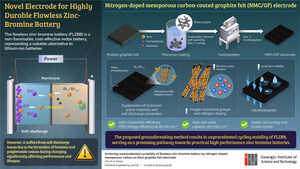Scientists at the GIST Propose a Non-invasive Approach to Estimating Lithium-ion Battery Degradation
Scientists develop an alternative diagnostic technology to evaluate the degradation mechanism of Li-ion batteries quickly
GWANGJU, South Korea, Feb. 23, 2022 /PRNewswire/ -- The emergence of electric vehicles has created a spike in the usage of lithium-ion batteries. Consequently, there is a need for diagnosing battery health reliably to prevent accidents from unexpected operational issues. To this end, scientists from the Gwangju Institute of Science and Technology in South Korea have now developed a rapid non-destructive analysis technique using cycling at high and low C-rates (the current during charging and discharging) for accurate detection of battery degradation modes.
Lithium-ion batteries lie at the heart of all modern electronics and are now being increasingly implemented in electric vehicles. As a result, there has been a rapid increase in its usage, and, with it, a growing demand for tools to test the "state of health" (SOH) of these batteries reliably. This is particularly important in light of the fact that understanding degradation symptoms in batteries is vital for improved maintenance and accident prevention due to malfunctions.
Li-ion batteries degrade via three different modes: loss of active materials (LAM), conductivity loss (CL), and loss of lithium inventory (LLI). Over the last few years, scientists have developed several techniques to non-invasively analyze these modes. The most widely used among them is the incremental capacity-differential voltage (IC-DV) analysis because of its good correlation with the degradation modes. However, IC-DV analysis is extremely time-consuming and cannot deduce the complex mechanisms associated with battery deterioration.
In a recent study led by Prof. Jaeyoung Lee from the Gwangju Institute of Science and Technology (GIST), researchers have now designed an alternative approach to the cumbersome IC-DV technique and have characterized the degradation modes by cycling graphite/LiNi0.5Mn0.3Co0.2O2 (NMC532) pouch cells with two different capacities at low and high C-rates (charging and discharging rate of a battery). Detailing the motivation behind this study, Prof. Lee says, "While many studies have been conducted to investigate the degradation symptoms of fatigued lithium-ion batteries with charge and discharge cycling data, the technology for rapid diagnosis is still not sufficiently developed. We believe that a rapid degradation diagnosis technology using high C-rate could enable real-time detection of the degradation modes and its utilization for monitoring the state of health of individual cells efficiently." This paper was made available online on 17 November 2021 and will be published in Volume 67 of the Journal of Energy Chemistry in April 2022.
The team first collected low C-rate data every 100 cycles of high C-rate analysis, and then converted the data into IC-DV curves using differential equations to evaluate the LAM and LLI modes of battery degradation. The former was calculated as a sum of the IC peak intensities due to its non-linear relation with C-rates, while the latter was estimated by extrapolation owing to its good linearity with C-rates. This, in turn, allowed for a rapid detection of LLI degradation.
The perspectives provided in this study can facilitate a rapid and detailed analysis of SOH, which could prove advantageous in the assessment of onboard battery systems. "The aim of our study was to help establish a facile diagnostic protocol for lithium-ion battery maintenance. Our proposed mechanism not only makes the process cost-effective but also eco-friendly by providing a faster and reliable selection process for battery reuse," concludes Prof. Lee.
Reference
Title of original paper: Rapid determination of lithium-ion battery degradation: High C-rate
LAM and calculated limiting LLI
Journal: Journal of Energy Chemistry
DOI: https://doi.org/10.1016/j.jechem.2021.11.009
About the Gwangju Institute of Science and Technology (GIST)
http://www.gist.ac.kr/
Contact:
Seulhye Kim
82 62 715 6253
[email protected]
SOURCE Gwangju Institute of Science and Technology

WANT YOUR COMPANY'S NEWS FEATURED ON PRNEWSWIRE.COM?
Newsrooms &
Influencers
Digital Media
Outlets
Journalists
Opted In




Share this article